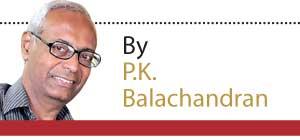Reply To:
Name - Reply Comment
Broad-based economic sanctions have adverse social impacts questioning their own commitment to ensuring human rights

Of all the punitive measures that the UN Human Rights Council (UNHRC) might take against Sri Lanka under the Sri Lanka Accountability Project, targeted sanctions rather than trade or economic sanctions are more likely.
economic sanctions are more likely.
The Western powers, which have been using sanctions as a coercive instrument of foreign policy, are now using economic sanctions sparingly because of their adverse impact on society at large. Large-scale social disruption will put into question the Western powers’ own commitment to upholding human rights.
In the light of this trend, the European Union is unlikely to deny Sri Lanka a renewal of the GSP Plus trade concessions at the end of the year. But sanctioning individuals is very much possible. Several individual Sri Lankans have already been sanctioned. And more may be in line.
According to the Office of the High Commissioner of Human Rights (OHCHR), the Sri Lanka Accountability Project (SLAP) has been collecting, consolidating, analyzing and preserving information and evidence on human rights violations.
The idea is to “develop possible strategies for future accountability processes for gross violations of human rights or serious violations of international humanitarian law in Sri Lanka, to advocate for victims and survivors, and to support relevant judicial and other proceedings, including in Member States, with competent jurisdiction,” OHCHR said.
In the oral update, the High Commissioner of Human Rights said:
“I am pleased to report that the project team established in our Office to advance accountability has continued to make progress pursuant to resolution 51/1. It is in the process of providing concrete support to several jurisdictions which have ongoing criminal justice investigations. It is conducting proactive investigation work on key cases and collecting, consolidating, and analyzing information and evidence from a variety of UN and other sources, which is preserved in a repository to be used for future accountability initiatives. Victims remain at the heart of this work, including through our active engagement with victim organizations and civil society more broadly.”
“Fundamentally, it is, and remains, the responsibility of the Sri Lankan authorities to directly acknowledge past violations and undertake credible investigations and prosecutions, alongside other accountability measures. However, as long as this accountability deficit remains, the international community can – and should – play complementary roles. Means to do so include use of accepted principles of universal and extraterritorial jurisdiction to investigate and prosecute alleged perpetrators, and support the relevant accountability processes in third States, as well as a fair application of targeted sanctions against credibly alleged perpetrators.”
The oral update went beyond war crimes and rights violations to include economic crimes.
“The economic crisis continues to have a severe impact on the rights and well-being of many Sri Lankans….. It is also vital to address the underlying factors of the crisis, including corruption, which was a loud and essential demand of the protests in 2022.”
Even without being told by the UNHRC, Canada imposed sanctions on four top Sri Lankan officials, including former Presidents Mahinda Rajapaksa and Gotabaya Rajapaksa, for “gross and systematic violations of human rights” during the armed conflict in Sri Lanka from 1983 to 2009.
 These sanctions were imposed under the Canadian Special
These sanctions were imposed under the Canadian Special
Economic Measures (Sri Lanka) Regulations. With some exceptions, these regulations prohibit any person in Canada and any Canadian outside Canada, from dealing in property, wherever situated, that is owned, held or controlled by a listed person or a person acting on behalf of a listed person; entering into or facilitating any transaction related to a dealing prohibited by these Regulations; providing any financial or related services in respect of a dealing prohibited by these Regulations; making available any goods, wherever situated, to a listed person or a person acting on behalf of a listed person; and providing any financial or other related services to or for the benefit of a listed person. Causing, facilitating or assisting in prohibited activities is likewise prohibited. The individuals listed in the Schedule to the Regulations are also inadmissible to Canada under the Immigration and Refugee Protection Act.”
In April, the US announced that former Sri Lankan Navy Commander Adm. Wasantha Karannagoda and his wife were banned from entering the US due to Karannagoda’s alleged involvement in human rights violations during the war.
Gary Clyde Hufbauer and Barbara Oegg of the Peterson Institute for International Economics based in Washington DC say in their 2000 publication that “targeted sanctions” or “smart sanctions”, like “smart bombs”, are meant to focus their impact on leaders, political elites and segments of society believed to have been responsible for rights violations while reducing “collateral damage” to the general public.
At the end of the 1990s, the UN realized that the “blunt weapon” of comprehensive embargoes or broad-based economic sanctions inevitably hurt those at the bottom of the economic heap.
“Given the poor track record of such sanctions in achieving their foreign policy goals, the conventional wisdom that civilian pain leads to political gain was questioned. It was then decided to fine-tune sanctions to direct them against those in power,” Hufbaur and Oegg say.
Targeted sanctioning will have a less societal impact than, say, the denial or withdrawal of GSP Plus trade concessions, but it is expected to break the morale of the sanctioned individuals and their close associates.
The targeted sanctioning of individuals in the subject country does not hurt the sanctioning country, but trade sanctions might. Withdrawal of GSP-Plus concessions could mean that European countries would be denied quality Sri Lankan goods at affordable prices.
The SLAP has a wider agenda than imagined. It not only covers war crimes but economic crimes too, including corruption, which is endemic. Curbs on or denial of normal democratic rights like free and fair elections could also come under the rubric of rights violations.
Recently, the US said that it would apply targeted sanctions on top Bangladeshis if the Bangladesh government failed to hold free and fair elections. The US said it would not give visas to people who obstructed free and fair elections. This would hurt the all-powerful Bangladesh ruling class.
ufbauer and Oegg say that financial sanctions in general have a less immediate impact on trade flows and therefore cause less suffering to the masses. Asset freezes are more effective in securing compliance. But asset freezes are used mainly in extreme circumstances such as during wars or armed conflicts. To be effective, asset freezes have to be done without warning because any inkling that they are due will enable the concerned parties to shift their funds to safer domains.
Although some kinds of sanctions deliver better and quicker results, powers which use sanctions as a coercive foreign policy instrument opt for less effective instruments so that they themselves are not open to the charge of violating human rights.
“All too often, the economic, humanitarian, and foreign policy costs of US sanctions far outweigh any benefits,” wrote Richard N. Haass in a Brookings website in 1998. Hulfbauer and Oegg, writing on the subject years later, would agree with him. And yet, the Western powers and the US continue to use sanctions as a major instrument of foreign policy.